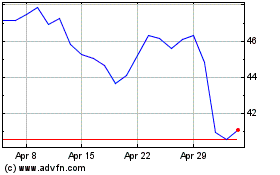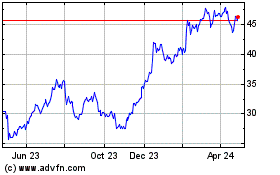Hedge Fund Gains $100 Million in Two Days on Bearish China Bet
August 21 2015 - 3:10AM
Dow Jones News
A Carlyle Group LP hedge fund that anticipated a sudden
currency-policy shift in China gained roughly $100 million in two
days last week, a sign of how some bearish bets on the world's
second-largest economy are starting to pay off.
The 75% return for Emerging Sovereign Group's Nexus fund
developed after China unexpectedly pushed the value of the yuan
lower on Aug. 11, according to people familiar with the matter. It
was the nation's biggest devaluation in two decades.
The sudden paper gains propelled the ESG hedge fund to a roughly
50% year-to-date return through mid-August, after fees. The surge
also helped the fund recover from losses earlier in the year.
Through the end of July, it had lost 11%, one of the people
said.
China has become an increasingly popular target for short bets
that asset values will deteriorate. But limited foreign access to
the country's equity and bond markets means there aren't many ways
to bet on outright declines in those markets, and the methods that
do exist tend to be small and illiquid.
Nexus, led by former fixed-income salesman Brian McCarthy,
instead focused on betting against China's currency. The fund
purchased a string of put options that gave it the right to sell
the currency at preset prices, within agreed-upon time frames.
Nexus was able to buy those options on the cheap over time because
most investors expected Beijing to support the yuan rather than let
it fall.
Putting on a similar trade now would be difficult, one
hedge-fund investor said, since the prices of yuan puts are now
higher due to the currency devaluation.
Bearish views on China have become more widespread among Wall
Street's elite in recent weeks amid China's stock-market meltdown.
Prominent investors including Paul Singer of Elliott Management
Corp. and William Ackman of Pershing Square Capital Management LP
raised concerns about China at an investment conference in
Manhattan last month.
Bridgewater Associates LP, the world's biggest hedge fund and a
longtime advocate of China's potential, told investors in July that
"our views about China have changed" and "there are now no safe
places to invest." After The Wall Street Journal published a
page-one story about Bridgewater's comments, the firm said "too
much has been made of the shift in their thinking" and that China
has "the resources and the capable leaders to manage these
challenges."
Mr. McCarthy has been sounding the alarm since starting Nexus in
2012 with a view that China's growth was unsustainable and
illusory, said a person familiar with his views.
"Much like the U.S. and Europe," ESG said in a 2013 presentation
reviewed by the Journal, "we believe that China will soon be
dealing with the fallout from a credit bust."
ESG predicted in its presentation that China's economy would
weaken, citing a spate of overbuilding and excessive debt. Any
moves made by China's central bank to stimulate the economy "would
likely result" in weakness to the yuan, ESG said.
Mr. McCarthy joined the New York hedge-fund firm in 2011 after
stints as a foreign-exchange sales executive at Royal Bank of
Scotland Group PLC and UBS Group AG. In the 1990s, he was a
fixed-income portfolio manager at American International Group Inc.
He often works closely with ESG co-founder Mete Tuncel, who heads
the firm's macro investing strategies, said people familiar with
the firm.
For a while, Mr. McCarthy's outlook produced uneven results as
China's economy and markets roared higher. The fund lost money each
year except for 2014.
But the value of the fund's assets jumped when China devalued
the yuan last Tuesday and again the next day, the people familiar
with Nexus said. As of several days ago, Nexus hadn't cemented the
gains, one of the people said.
Private-equity giant Carlyle, in contrast, has long been a
bullish investor in China, according to a firm spokesman, having
invested $6.3 billion in China since 1998. People familiar with
Carlyle emphasized that while ESG was majority owned by Carlyle, it
makes its own investment decisions.
Nexus's paper profits mark a rare bright spot for Carlyle's
hedge-fund business. It owns stakes in two other hedge-fund firms
that have struggled amid performance problems and investor
withdrawals. Clients of Claren Road Asset Management LLC recently
requested nearly $2 billion of their money back, and Carlyle has
parted ways with the founders of Vermillion Asset Management
LLC.
ESG, which has about $5 billion in assets, has also had its
share of ups and downs. It was founded in 2002 by Kevin Kenny and
Mr. Tuncel, former Morgan Stanley emerging-market debt traders, and
Jason Kirschner, a former Morgan Stanley research analyst. It
received a coveted "seed" deal from Julian Robertson's Tiger
Management Corp.; Tiger still owns a piece of ESG.
Carlyle bought a 55% stake in ESG in 2011, and since then assets
under management have tripled. But its flagship fund has lost money
last year and this year.
Write to Juliet Chung at juliet.chung@wsj.com
Subscribe to WSJ: http://online.wsj.com?mod=djnwires
(END) Dow Jones Newswires
August 21, 2015 02:55 ET (06:55 GMT)
Copyright (c) 2015 Dow Jones & Company, Inc.
Carlyle (NASDAQ:CG)
Historical Stock Chart
From Jun 2024 to Jul 2024

Carlyle (NASDAQ:CG)
Historical Stock Chart
From Jul 2023 to Jul 2024
